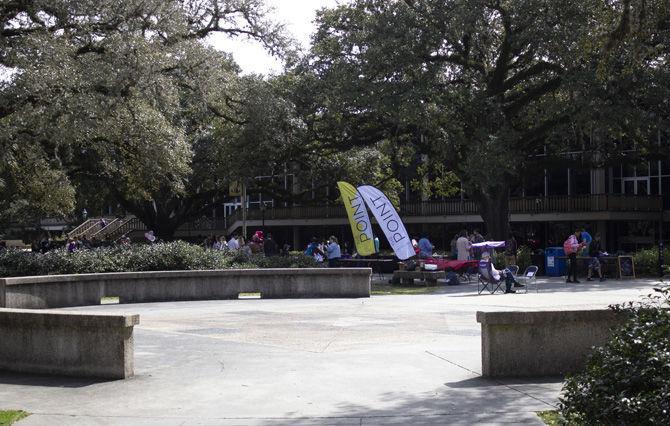Anyone who walks through LSU’s Free Speech Plaza can expect to be stopped by student organizations or evangelical groups, but the University is still considered an institution with policies that unconstitutionally restrict the right to free speech protected by the First Amendment.
The Foundation for Individual Rights in Education, a nonprofit and nonpartisan educational foundation that aims to defend and sustain individual rights in American colleges and universities, gave LSU a “red light” rating. This rating is reserved for institutions with at least one policy that both clearly and substantially restricts freedom of speech or bars public access to its speech-related policies.
“[A university is] supposed to be the marketplace of ideas, but it’s also supposed to be a place where people can go to class and they can teach,” said Azhar Majeed, FIRE’s vice president of policy reform.
FIRE listed two of the University’s policies as speech codes, which FIRE defines as university regulations prohibiting expression that would be constitutionally protected in society at large. The University’s red light speech codes are the Computer Users’ Responsibilities policy and Sexual Harassment of Students policy.
Part of the Computer Users’ Responsibilities policy holds that users shall not utilize computing resources to download material that is defamatory, obscene, fraudulent, harassing or threatening, among other stipulations.
The Sexual Harassment of Students policy defines sexual harassment as a form of unlawful sexual discrimination, including unwelcome verbal, visual or physical conduct of a sexual nature.
Another facet of the policy FIRE cites is that it defines hostile environment sexual harassment as, “unwelcome verbal or physical conduct of a sexual nature or gender-based conduct in which the conduct has the purpose or effect of unreasonably interfering with an individual’s academic, work, team or organization performance.”
Majeed said that while schools should prevent harassment, it should not come at the expense of free speech. The University’s policy could potentially result in offensive language or suggestive comments being considered harassment, and those kinds of speech are protected under the First Amendment.
LSU President F. King Alexander fired former tenured education professor Teresa Buchanan for violating the University’s sexual harassment policy at the time, in 2015. Buchanan repeatedly used profane language and made comments about her sex life and the sex lives of students, according to a 2018 article published by The Reveille.
FIRE helped Buchanan file a lawsuit against The University administration for violating her free speech and due process rights. The U.S. District Court for the Middle District of Louisiana later dismissed Buchanan’s suit.
Majeed said both students and faculty members have the right to academic freedom, and universities should not intervene when it comes to free speech on campus, since public institutions like LSU are bound to the First Amendment.
LSU political communication professor Robert Mann said although he was not familiar with the Buchanan case, vulgar language in a classroom setting can inhibit learning and is different from the speakers students are exposed to in Free Speech Plaza.
“The guy screaming profanities at you in Free Speech [Plaza] isn’t the one giving you a grade,” Mann said.
Students can generally avoid speech they disagree with in Free Speech Plaza by simply not going there, but they cannot avoid their classrooms. Mann said the power dynamic professors have with their students could be a problem when teachers harass students or use obscene language.
“If I censor myself in some way in class, it’s not because I’m afraid that the University’s going to come down on me,” Mann said. “It’s because I don’t want to get in the way of learning.”
Mann considers himself one of the University’s more outspoken professors, and he used to write a weekly column in The Times-Picayune in which he often criticized Alexander. Mann said he never received any backlash for doing so.
“I can just say that from my experience as a professor who has been pretty outspoken in criticizing the University and the state in general — and state leaders — I’ve never felt any restriction or intimidation on my ability to speak out,” Mann said.
Mann said he believes the leadership of the University supports free speech, and he does not personally know anyone whose speech has been restricted on campus in any capacity.
Rachel Henry, director of event managing and marketing for LSU Auxiliary Services, said the University only intervenes in Free Speech Plaza when speakers are inciting violence, which is not constitutionally protected.
Auxiliary Services requires students seeking to put a table in Free Speech Plaza to complete a request form two business days in advance. The University does not look into what the group will be saying or promoting. Individuals or groups that are not affiliated with the University do not have to fill out a form to be in Free Speech Plaza, but Auxiliary Services does not provide them with resources. Hate speech is protected as free speech in the First Amendment, and speakers are not barred from using hate speech in Free Speech Plaza.
Henry said students should know they also have the right to say whatever they want. When groups are being offensive or saying something they disagree with, students can freely debate them.
“They spread hate,” Henry said. “I encourage [students] to spread love.”
LSU deemed a ‘red light’ school for policies restricting free speech
February 20, 2019
Free Speech Alley is located directly in front of the LSU Student Union on Thursday, Feb. 14, 2019.







